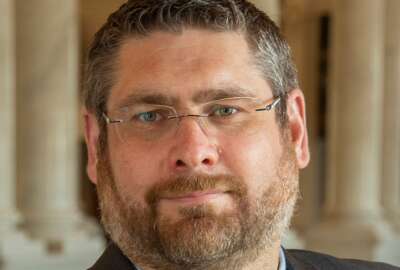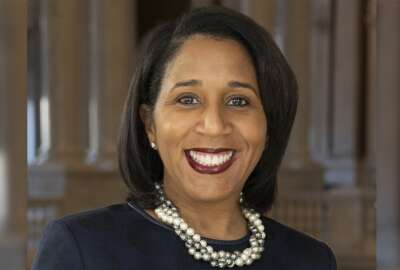
Inside the Copyright Office’s honors program for young lawyers
The Copyright Office runs a two-year honors program for young lawyers named after Barbara Ringer, the office's first woman director. The Federal Drive with Tom...
Best listening experience is on Chrome, Firefox or Safari. Subscribe to Federal Drive’s daily audio interviews on Apple Podcasts or PodcastOne.
The name Barbara A. Ringer has deep meaning to the U.S. Copyright Office. The late Ringer worked there for more than 30 years, and served as its first woman director in the 1970s, after winning a discrimination lawsuit. She helped modernize copyright law, and was recognized internationally. Today the Copyright Office runs a two-year honors program for young lawyers named after Ms. Ringer. The Federal Drive with Tom Temin spoke with one of the current fellows: Keyana Pusey.
Interview transcript:
Tom Temin: All right, so tell us what you actually do for the Copyright Office under this two year honors program.
Keyana Pusey: Yeah, just to give a little bit of briefing, you did an excellent job just bringing in Barbara Reiner and the trailblazer that she was and so the fellowship is an 18 to 24 month paid fellowship for attorneys in the initial stages of their careers. And it’s a really an amazing opportunity for law clerks and attorneys who are interested in or have already worked in copyright law. And you get the opportunity to work in not just one division, or on one team. But you get to work closely with a lot of the divisions under the Copyright Office, for example, the Office of General Counsel, offices of Policy and International Affairs and things like that. And so it’s really been an amazing time, and it’s only been a year, but with a little bit of a year left, I have so many things that I still want to accomplish.
Tom Temin: And what attracted you to copyright law, of all the branches? I mean, you could have been an ambulance chaser making millions.
Keyana Pusey: I didn’t think about that growing up, about being an ambulance chaser. But I just think that my path to IP started well before I even really understood what intellectual property was. And I’ve always been a lover of things of music and movies and TV shows. My dad was actually a part time DJ growing up. So I kind of grew up exposed to a lot of music. I took an IP survey course, which is an elective that you can take in our one year at American University, Washington College of Law, I’ll give them a shout out. And so ever since then, it’s just been, I don’t know, one-track-minded going towards intellectual property. I like what I’m learning so far. And I would love to keep going.
Tom Temin: Yeah, it spans a lot of areas, and Congress has the copyright piece, the patents and trademarks are over in the executive branch. What are the issues in copyright law these days? What is animating the whole industry?
Keyana Pusey: One of the big things that the office has been focused on is the copyright claims board, which launched this year. I haven’t worked personally on it. But it’s been a really hard effort, a really big push through for a lot of teams, a lot of work cross divisionally. And it’s been a real accomplishment for the office having that launch this year.
Tom Temin: And what are some of the specific things you’re doing there?
Keyana Pusey: Day to day, it can really change because I share my time with the Office of General Counsel (OGC). And then the Office of Policy and International Affairs, PIA for short. And so every day brings its own new challenges. I get the opportunity to work on domestic and international copyright law matters, can help with litigation matters. A lot of site checking, obviously, for studies and reports to Congress and other audiences. And I’ve just done a lot this year. One of my proudest accomplishments was working on the working group that participated in assisting the Solicitor General draft and review, the amicus brief filed on behalf of the U.S. government in the Andy Warhol versus Goldsmith case.
Tom Temin: What was that case all about? Just refresh my memory?
Keyana Pusey: Yeah, so that case involves a portrait of prints that Warhol created to accompany a Vanity Fair article and long story short, it’s led to some lengthy litigation between the Andy Warhol Foundation and the photographer, Goldsmith.
Tom Temin: All right. Well, let’s hope the soup can doesn’t weigh in. Or then you’ve really got a complicated case. We’re speaking with Attorney Keyana Pusey, she’s a member of the Ringer Honors Program at the U.S. Copyright Office. What are your aspirations for this? Once you leave the program? Do you hope to work for the Copyright Office permanently or set up shop? I mean, what does this lead to, do you think, for you?
Keyana Pusey: Honestly, that’s a great question. I have a year left. So I’m not 100%. So I would obviously love to continue my work at the Copyright Office. But, you know, I’m open to you know, just wherever my next position is, just to be at a place that I can continue to grow, somewhere that challenges me, that pushes me and molds me to become the lawyer I know that I can be.
Tom Temin: And by the way, just a question about copyrights. Because this came up the other day in an interview I did with the former U.S. Patent and Trademark director, are copyrights country specific? That is to say, if you have a copyright for a logo or something piece of art in the United States, do you also need to apply in other countries to copyright it there?
Keyana Pusey: Yeah, so copyright law is territorial and national in scope. So regardless of where the author lives, or where the work was published, the copyright protection that’s afforded to that word does depend on the national laws of the country in which you’re seeking protection.
Tom Temin: So there is a big international aspect to this whole thing, that is do countries, say, in the EU and the United States try to harmonize their copyright laws to your knowledge?
Keyana Pusey: In international — at least European — travel, or everywhere years ago, you used to see Kodak signs on every other street corner and Coca Cola, Budweiser, some of the big American brands, but they have to get their copyright established individually in all of those places.
Keyana Pusey: 100% In terms of the international aspect, and how big this is, international issues takes up a big part of my job, actually, and there’s a lot of intergovernmental, and with foreign governments, coordination and collaboration. I actually did a panel on that for a program, the International Copyright Institute. So I’d led a panel on that, and it’s a big part of my work today, and a lot of international copyright lawyers.
Keyana Pusey: Yeah, I believe so.
Tom Temin: Okay, interesting. And what’s it like working in a congressional agency? Are they nice to you there?
Keyana Pusey: They’re amazing people, I think it’s just been a great opportunity to work with just really smart individuals. Sometimes when I’m on calls, they kind of sling back statutes by number and just case names, their recall is just amazing. And so it’s just been a great opportunity to learn from amazing copyright experts.
Tom Temin: Sure, Congress will keep an agency on its toes, if you work for Congress. That’s for sure. And have you had any contact with members? I mean, sometimes you’ll find that certain members have a really deep and abiding interest in a particular area of the federal government, including patents or copyrights.
Keyana Pusey: Yeah, definitely have a lot of specific members, some more than others, who are very interested in the direction of intellectual property in this country. And the work that the Patent and Trademark Office and the Copyright Office does. And so there are specific staffers who we get used to seeing in our email Outlook.
Tom Temin: Sure. And by the way this two year honors program, they do pay you while you’re there?
Keyana Pusey: Oh, absolutely. It’s a paid fellowship.
Tom Temin: Sounds like you would recommend other newly-minted attorneys check out this program?
Keyana Pusey: 1,000%. This program has been amazing in the things that I’ve done in just just a short amount of time. It’s just been more than I could imagine. And so if you hear the things that I’ve been doing, and you want to apply yourself, the application is actually open until December 31. And so go and check it out today. Information about eligibility and how to apply it on our website. And you can also find a link on our Twitter, @CopyrightOffice.
Copyright © 2024 Federal News Network. All rights reserved. This website is not intended for users located within the European Economic Area.
Tom Temin is host of the Federal Drive and has been providing insight on federal technology and management issues for more than 30 years.
Follow @tteminWFED
Related Stories





